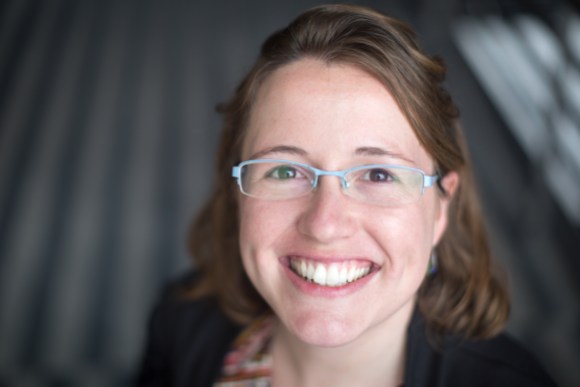
Sarah Chambers’ professional life began at 16 as a spa receptionist in the Tropicana Hotel and Casino in Las Vegas. A musician at heart, she learned early that holding down a job was a necessity—even more so in Chile. Over the years she has worked as a freelancer, however, she found a new passion after her introduction into Wikipedia.
“I was working with a startup company with people from Ghana, and the guy started talking to me about traditional culture in [his country],” said Chambers, now 29. “And I thought, oh, I bet there’s nothing [about it] in the Spanish Wikipedia. And sure enough, there were a few things in English, but not much.”
Chambers wrote an article about Ghanian Kente cloth and translated it into Spanish. “Almost nothing exists about Ghana in Spanish,” she tells us.
She began watching and supporting her partner—Wikipedian (Wikipedista en Español) Eduardo Testart—from the sidelines, “getting my feet wet a little at a time.”
“I always wanted to help volunteer physically more than online,” said Chambers, explaining her early journey. “I’m a big proponent of volunteering in person. So coming to meetings, helping out with the events and logistics, that’s really how I got my start in the Wikimedia movement, not by the computer.”
Today, Chambers is the Board Secretary for Wikimedia Chile, an independent movement affiliate organization. Recently, through her dedicated efforts, her chapter coordinated a two-day workshop and edit-a-thon celebrating International Women’s Day.
It was the first event of its kind that Chambers took a lead in organizing, and it ended up being “our most successful edit-a-thon,” she said.
Concerned that she would need additional support for the event, Chambers used social networking to gain interest and find collaborators. Through Wikipedia Chile’s Meetup group—Wiki Force Chile — and other online users, she was able to partner with the Women Who Code and Girls In Tech meetup groups.
“You’ve got to find similar groups that can help leverage your talents, your interests, so that you both win,” Chambers explained. “So basically, we found similar groups that were looking to do a similar thing—International Women’s Day. Everybody won.”
Excitedly, Chambers shared how the event panned out:
We actually had a full house … almost 40 people came for the workshop, which is pretty hardcore. It was about three to four hours. And then we always go out, that’s the key, I think, signature, of Wikimedia Chile. We always go out to have lunch or drinks after an event. And we invite everybody, if they want, to hang out afterwards … [to] continue the conversation. And it’s not all nerds. We talk about life, we talk about music, where you’re from, what you like to do. So that is the really rewarding part, too, is the bonding experience, of being able to share with other people.
And then the day after, we had the edit-a-thon. Which we had probably about 15-17 people come. It was a Sunday. We consider this a success because almost every single person wrote an article who was there.
It was a good experience because we really got into the off-shoots and capabilities. There was a contest going on … to name an article … in Spanish, Italian, Portuguese, and I came [up] with … La Mujer Que Nunca Conociste, which is The Woman You’ve Never Known.
So we had a contest there that the participants could continue participating in. That was just wonderful because the stars aligned and everybody came. And people were telling me please, please, we hope this is not a once a year thing. You have to come back and do this again.
Despite her successes with the local chapter, Chambers said there are challenges in working in Chile. Many Chileans, she said, don’t begin their professional life until they are older, so often times she works with individuals who have little work experience. There’s also less of a focus on volunteerism, an altruistic activity that is vital to the Wikimedia movement, which is run by volunteers from all around the globe.
“Volunteering does not have the same concept as in the United States,” Chambers said. “In the United States, you could wake up, you go outside and you go to any charity organization or big organization and say, ‘I want to volunteer.’ And that same day, they will get you a desk or a place, and you do a task and you start volunteering immediately. In Chile, it does not work like that at all. It’s a very formal system. Even nonprofits are run like businesses because the law kind of demands that they act so, and the requirements are very similar.”
Chambers doesn’t let anything stop her as she finds ways to grow her local chapter and provide ideas for other Wikipedians around the globe. Some of these include educating others about Wikipedia via Chromecast, continuing to host collaborate events, networking with potential Wikimedia funding partners and, of course, good old-fashioned word-of-mouth.
Interview by Jonathan Curiel, Senior Development Communications Manager
Profile by Michelle Fitzhugh-Craig, Wordsmith, Communications
Wikimedia Foundation

Can you help us translate this article?
In order for this article to reach as many people as possible we would like your help. Can you translate this article to get the message out?
Start translation